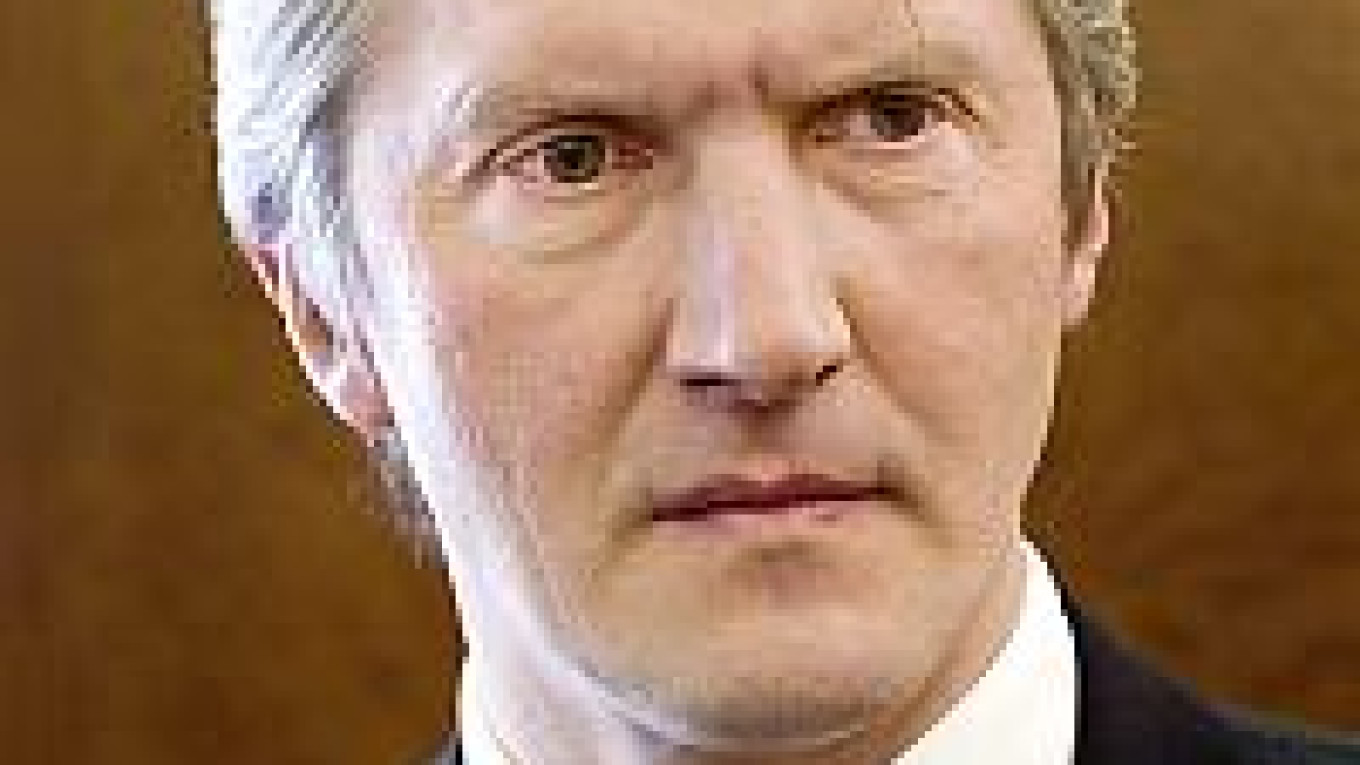But before he was hauled out of a hospital in handcuffs late Wednesday on suspicion of embezzling $280 million from the state nine years ago, little else was known of Platon Lebedev.
And what is known is remarkably short on detail.
A business partner of Russia's richest man, Mikhail Khodorkovsky, since 1989, when what is now Menatep Group was first formed, Lebedev had managed and voted Menatep's 61 percent stake in top oil producer Yukos prior to his arrest.
Khodorkovsky told Interfax Thursday that an independent director had been named to replace Lebedev while the investigation takes its course.
People familiar with the workings of Menatep say Lebedev intentionally keeps a low profile so as not to draw attention to the fact that he wields vast power as the man responsible for the business interests of his partners, as well as for the financial state of the group as a whole.
So low did he want his profile to be that on more than one occasion he threatened reporters who wrote unfavorable stories regarding his efforts to rebrand the Menatep franchise in the wake of the 1998 meltdown. A few years ago, in fact, he became so outraged about critical articles in the Western press that he personally called the journalists who wrote them and threatened to go public with "compromising personal material" if public apologies were not forthcoming, according to one of the reporters, who asked not to be identified.
"Lebedev's task has always been to manage financial assets," said Alexei Mikhin, head of the Center for Political Information, a Moscow think tank that tracks big businesses.
"Politically, he is the cleanest in the [Menatep] group. That's why so little information is available on him. From a financial standpoint, however, Lebedev is the dirtiest of the group. But because of his bright mind, all of Menatep's financial maneuvers have been done very cleverly, so I bet the current case against him has no legal basis and will be closed soon," Mikhin said.
Lebedev was born in Moscow in 1959, making him four years older than Khodorkovsky. He graduated from the prestigious Plekhanov Financial Academy in 1981. Khodorkovsky received his second decree from the same institute seven years later.
From 1981 to 1989, Lebedev worked as the chief economist in a Soviet enterprise called Zarubezhgeologia, which explored for natural resources in dozens of countries around the world. It was at Zarubezhgeologia that Lebedev would meet another future Yukos billionaire, Leonid Nevzlin. Nevzlin, who is widely acknowledged as Menatep's public relations genius, later brought Lebedev into Khodorkovsky's clan. Nevzlin, now a Federation Council senator, is the second of the Yukos "core shareholders," between Khodorkovsky and Lebedev.
Between 1989 and 1992, Lebedev headed the group's currency and finance department. In 1993, Lebedev became president and a member of the board of the now defunct Menatep Bank and within two years the group could claim ownership of controlling stakes in more than 80 of the nation's largest companies -- many of which, such as Apatit (for which Lebedev was arrested), Avisma and Steklovolokno, were the leaders in their industries, according to the Center for Political Information.
In 1995 and 1996, Menatep acquired from the government and for a song the bulk of what is now Yukos. In 1995, Menatep experimented with a new name, grouping all of its holdings into a company called Rosprom, with Lebedev as first deputy chairman and deputy chairman of the board of directors.
After 1998, Menatep was resurrected as Group Menatep Ltd., replacing Rosprom as the management company. Menatep Bank was liquidated after the crisis and its assets were transferred to Trust and Investment Bank, and 45 affiliates of the Menatep Bank went to Menatep SPb. Around the same time, Lebedev became president of Yukos-PM, the Yukos subsidiary for oil refinery and sales of oil products.
Since 2002, Lebedev has headed Group Menatep Ltd., which is registered in Gibraltar and controls $30 billion in assets. Group Menatep's largest shareholders are Khodorkovsky (9.65 percent) and Nevzlin (8 percent). Lebedev, Vladimir Dubov, Mikhail Brudno and Vasily Shahnovsky all have 7 percent. A trust fund indirectly owned by Khodorkovsky but managed by Lebedev holds 50 percent of Group Menatep.
A Message from The Moscow Times:
Dear readers,
We are facing unprecedented challenges. Russia's Prosecutor General's Office has designated The Moscow Times as an "undesirable" organization, criminalizing our work and putting our staff at risk of prosecution. This follows our earlier unjust labeling as a "foreign agent."
These actions are direct attempts to silence independent journalism in Russia. The authorities claim our work "discredits the decisions of the Russian leadership." We see things differently: we strive to provide accurate, unbiased reporting on Russia.
We, the journalists of The Moscow Times, refuse to be silenced. But to continue our work, we need your help.
Your support, no matter how small, makes a world of difference. If you can, please support us monthly starting from just $2. It's quick to set up, and every contribution makes a significant impact.
By supporting The Moscow Times, you're defending open, independent journalism in the face of repression. Thank you for standing with us.
Remind me later.


